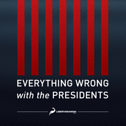Even in the small space of just thirty days, William Henry Harrison still managed to do everything wrong.
William Henry Harrison was president from the time of his inauguration on March 4, 1841 until one month later (April 4, 1841) when he died of a combination of pneumonia and enteric fever. Libertarians, of course, often like to joke that Harrison is their favorite president because he did not have time to screw anything up. Well, I am here to tell you that Harrison’s tenure was no laughing matter. He did, after all, begin by taking the oath of office, which committed him to protecting a wretchedly iniquitous constitutional regime that protected slaveowners in the South and corporatists of all description in the North. Then, Harrison tempted fate by trying to reassure the public that despite his age (68), he was still vigorous enough to be president. With neither coach nor cloak, Harrison rode his own horse through the cold, wet, bacteria-rich streets of Washington, DC to deliver the inaugural address. He did not know it at the time, but Harrison the great Indian fighter, the great protector of the American people against the British, opened himself right up to assassination by microbe. Add to that his rambling, excessive and tiresome two-hour speech and Harrison immediately started off on an awful path.
“Everything Wrong with the Presidents” series focuses on, as the title suggests, everything each president did wrong while in office. While many presidents enacted worthwhile, and even occasionally beneficial, policies, that’s not what these essays are about. Thus, silence regarding the good actions should not be taken as denial of their existence.
In his speech, Harrison finally committed himself to various policies in a way that he never did in the 1840 campaign. Essentially, he endorsed Henry Clay’s “American System” of protective tariffs, national banking, and national funding for internal improvements projects. This was of course music to Clay’s ears and exactly the sort of tune congressional Whigs were hoping to hear from the Hero of Tippecanoe. Harrison was their political deliverance from Jacksonianism, and now eager Whigs flooded Washington to reap the harvest. Senator Clay more or less expected Harrison to act as his puppet president, dutifully signing Whig legislation into law and overturning the Jackson-Van Buren years. When Clay petitioned Harrison with a set of his own Cabinet nominees, Harrison famously slashed back, “Mr. Clay, you forget that I am the President.” Harrison spent his month primarily entertaining an endless horde of Whig office seekers, potential Cabinet nominees, and social calls. He also called a special session of Congress to (once again) display his vigor and executive energy by immediately getting to work. I can barely imagine a worse start to a new presidency than calling Congress into session more than they had to be.
The 27th Congress met mid-month to confirm a few Cabinet positions, including Massachusetts’ Daniel Webster as Secretary of State and Kentucky’s foremost Clay man (after Clay himself), John J. Crittenden, as Attorney General. From the beginning, the Cabinet was as divided and factional as the Whig Party itself, and Webster biographer Robert Remini recounts a tense moment when the Cabinet attempted to strongarm Harrison into appointing a Webster man for Governor of the Iowa Territory. Harrison refused in preference of his original choice and the president made his point by handing his Secretary of State a simple note during the meeting. He ordered Webster to read the note aloud: “William Henry Harrison, President of the United States.”
Well, not for long. That was March 25. The next day he caught a cold and the 19th century doctors went to work. Their cures (including leeches and castor oil—which induces diarrhea) were worse than the disease and the president died nine days later. He left his party in a mess, sharply divided and its leadership contested from all angles. Even Harrison, with a mere 30 days under his belt, did everything wrong.
